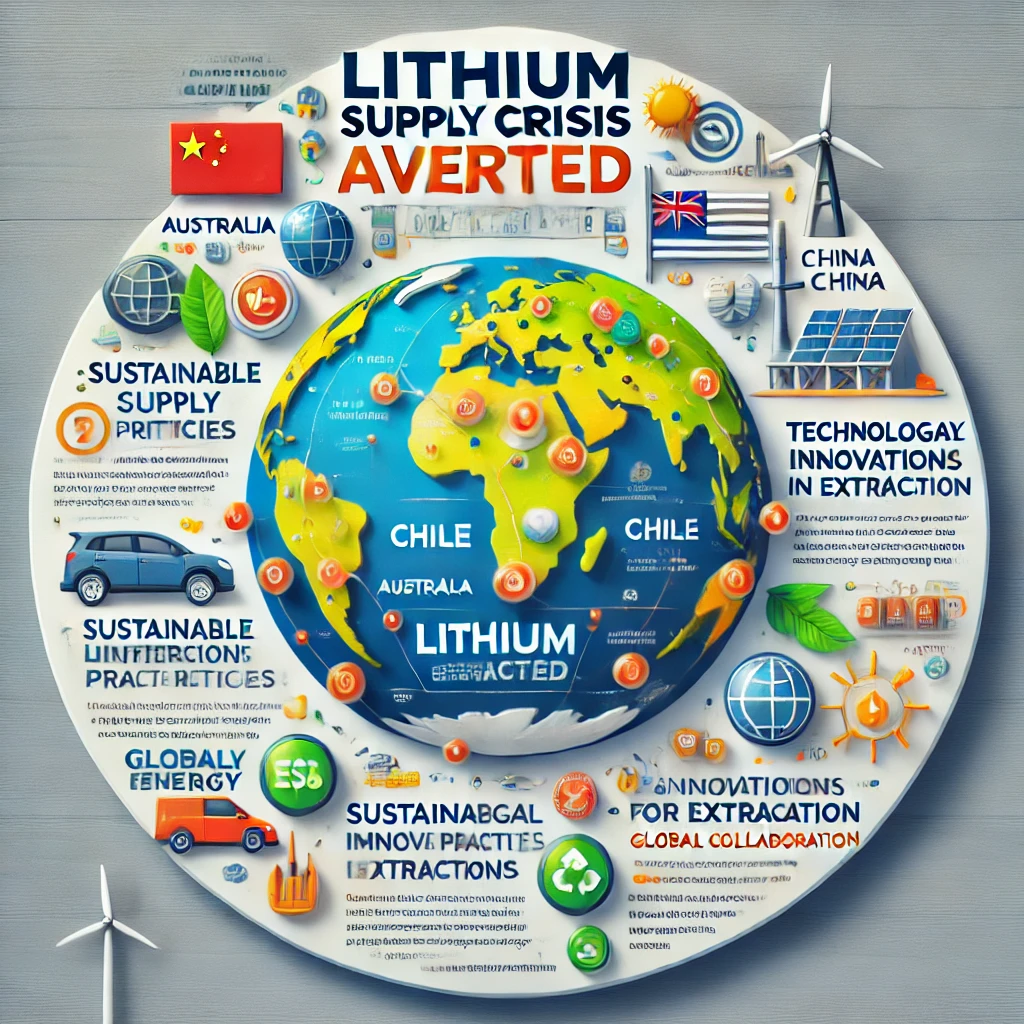- November 18, 2024
Lithium Supply Crisis Averted: Ensuring a Stable Future for Energy Transition

Lithium Supply Crisis Averted: Ensuring a Stable Future for Energy Transition
The lithium supply crisis that once threatened to derail the global energy transition has been effectively averted, thanks to strategic innovations, investments, and international collaboration. As demand for lithium continues to surge, addressing bottlenecks and adopting sustainable practices is crucial to maintaining this momentum.

Global Demand Surge for Lithium
Lithium plays a vital role in electric vehicle (EV) batteries and renewable energy storage systems. The exponential growth in EV adoption and clean energy initiatives has pushed global lithium demand to unprecedented levels. Projections suggest it could exceed 3 million tonnes annually by 2030.
Geographical Concentration of Lithium Resources
Lithium reserves are concentrated in a few countries, with Australia, Chile, and China producing over 85% of the world’s supply. This geographical limitation creates vulnerabilities, as supply disruptions in these regions could have widespread repercussions.
Advances in Lithium Extraction Technologies
Technologies like Direct Lithium Extraction (DLE) are revolutionizing how lithium is sourced. These methods promise higher efficiency and lower environmental impact compared to traditional mining.
Environmental Impacts of Lithium Mining
Lithium extraction often poses significant environmental challenges, including water depletion and habitat disruption. Sustainable mining practices, such as using renewable energy in operations, are critical to minimizing these impacts.
Supply Chain Bottlenecks and Solutions
Lithium’s journey from mine to market is fraught with challenges, including transportation delays, processing bottlenecks, and labor shortages. Solutions such as vertical integration and long-term supplier partnerships are helping stabilize the supply chain.
Economic Effects of Lithium Price Fluctuations
Fluctuating lithium prices directly affect battery costs, influencing EV affordability. Stable pricing is essential to accelerate the adoption of clean technologies.
Role of Lithium in Energy Transition and EV Growth
Lithium is indispensable in achieving global decarbonization goals. Its applications in EVs, energy grids, and portable devices ensure a critical role in reducing fossil fuel dependency.
Policy and Regulatory Challenges in Mining
Regulatory approvals and community resistance can delay mining projects. Transparent practices and collaboration with local stakeholders are necessary to address these challenges.
Sustainable Mining Practices
Mining companies are adopting green practices, including recycling wastewater and restoring ecosystems, to ensure environmentally responsible lithium production.
Ethical Concerns and Community Engagement
Ethical sourcing of lithium requires engaging with local communities and addressing their concerns. Fair wages, safe working conditions, and minimal disruption to livelihoods are key priorities.
Impact of Technological Innovations on Lithium Production
Innovations in battery chemistry and recycling technologies could reduce reliance on newly mined lithium, easing pressure on resources and extending their usability.
Long-Term Strategies to Avoid Future Supply Shortages
Governments and industries are investing in exploring new reserves, improving recycling, and developing alternative battery materials to secure long-term supply.
International Collaboration to Stabilize the Supply Chain
Global partnerships between countries and industries are essential to ensuring a balanced and reliable supply chain that can withstand geopolitical and market pressures.
Vertical Integration in Lithium-Dependent Industries
Companies like Tesla are vertically integrating their supply chains to secure steady access to lithium, ensuring uninterrupted production and innovation.
Potential Alternatives to Lithium in Battery Technology
Researchers are exploring alternatives like sodium-ion and solid-state batteries, which could complement or even replace lithium in certain applications.